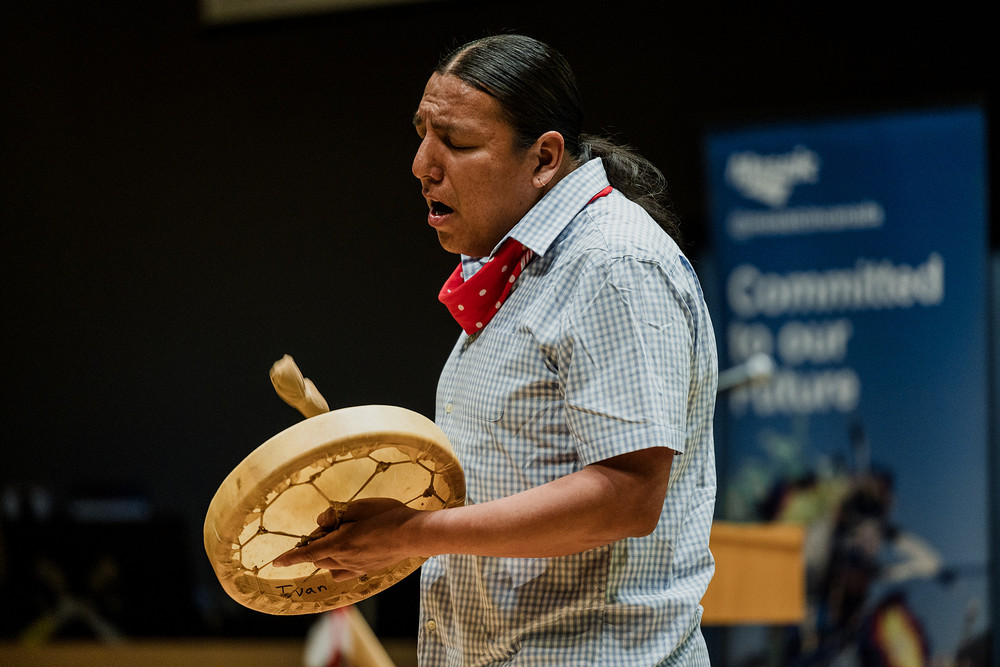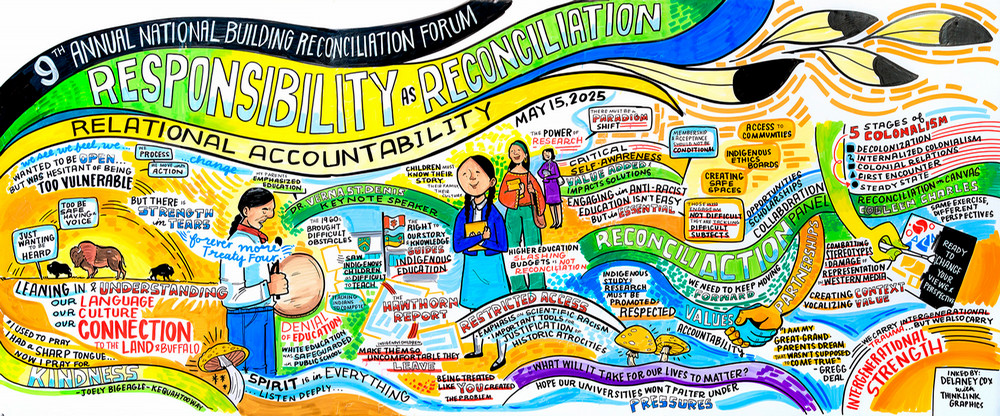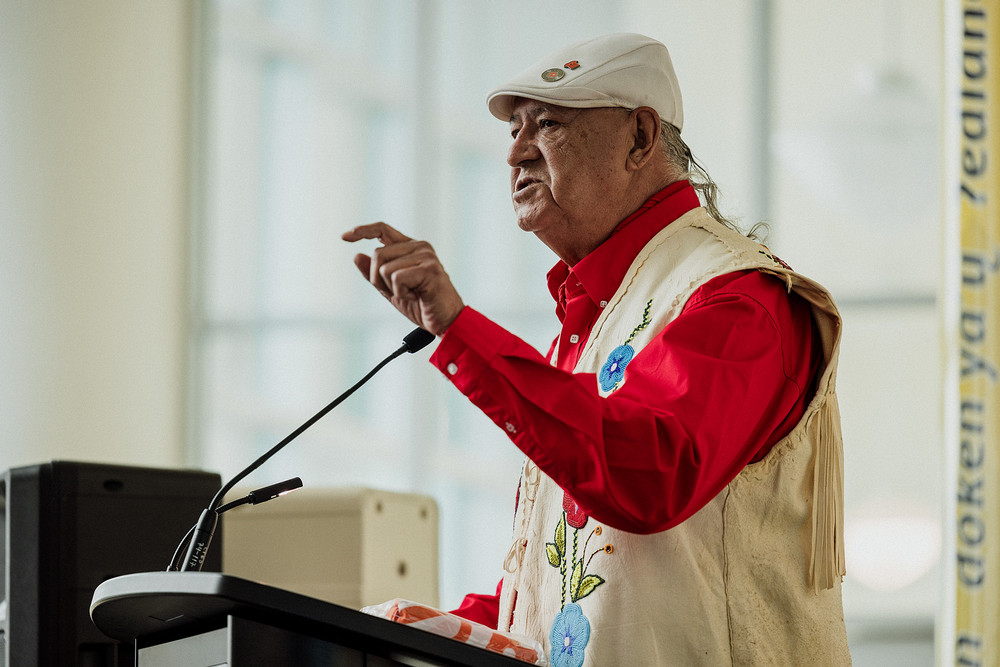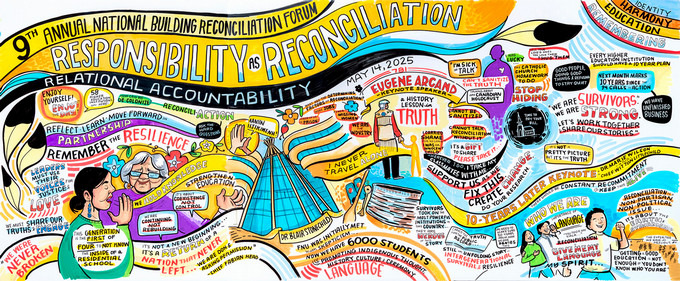In May, the First Nations University of Canada and the University of Regina co-hosted the 9th National Building Reconciliation Forum. Centred around the theme Responsibility as Reconciliation: Relational Accountability, this year’s Forum marked a decade since the release of the Truth and Reconciliation Commission of Canada’s 94 Calls to Action.
One of the largest, and highest-attended Forums in the 10-year history of the event, FNUniv and the U of R welcomed 250 attendees to their campuses, representing almost 60 post-secondary institutions from across Canada. Attendees included university Presidents, Provosts, Vice Presidents, and Indigenous leadership teams from across Canada – from British Columbia to Newfoundland, and as far north as the Yukon.
“Co-hosting this year’s Forum alongside the First Nations University of Canada was both an honour and a responsibility. It meant creating space for deep truth-telling, courageous conversations, and the kind of relationship building that reconciliation demands,” says Lori Campbell, Associate Vice-President (Indigenous Engagement) at the University of Regina. “Welcoming university leaders from across the country to our campuses reminded us that this work is collective, ongoing, and rooted in accountability to Indigenous peoples and future generations.”
Day 1
The first day of the Forum began in a good way, with a pipe ceremony, followed by a morning song from Everet "Chase" Sayer, Dinaye Sayer, and Cree Sayer then opening remarks at First Nations University.
Throughout the day, attendees heard from FNUniv faculty member Dr. Blair Stonechild and residential school survivor Eugene Arcand, and Truth and Reconciliation Commission Commissioners Dr. Marie Wilson and Chief Wilton Littlechild reflected on the 10 years since the TRC of Canada released the 94 Calls to Action.

Peter Brass led a hide scraping and traditional tanning workshop. Credit: Photo by Tenille K Campbell / sweetmoon photography
There was also an opportunity for hands-on learning and moments of reflection, as attendees were invited to participate in a hide scraping and traditional tanning workshop with FNUniv Art Collections Manager Peter Brass and engage in conversation circles with other post-secondary leaders.
Day 1 ended with the Reflections on Reconciliation banquet, where FNUniv Board Chair Sherry Saevil and U of R Board Chair Cadmus Delorme discussed how Boards of post-secondary institutions can support, sustain, and deepen their reconciliation efforts.
Welcoming university leaders from across the country to our campuses reminded us that this work is collective, ongoing, and rooted in accountability to Indigenous peoples and future generations. — Lori Campbell, Associate Vice-President (Indigenous Engagement)
Day 2
Joely BigEagle-Kequahtooway began the second and final day of the Forum with an opening prayer, followed by a morning song shared by Preston Littletent.

Preston Littletent, Knowledge Keeper for the ta-tawâw Student Centre, shared a Morning Song on Day 2 of the Forum. Credit: Photo by Tenille K Campbell / sweetmoon photography
Post-secondary leaders took to the stage, with Dr. Verna St. Denis, Professor Emerita of Education at the University of Saskatchewan, discussing anti-Indigenous racism and how universities can address the TRC of Canada’s 94 Calls to Action.
Lori Campbell also led the ReconciliACTION Panel discussion with Dr. Jacqueline Ottmann, President of FNUniv, Dr. Jeff Keshen, President and Vice-Chancellor of the U of R, Dr. Edward Doolittle, Associate Dean (Research and Graduate Studies) at FNUniv, and Dr. Chris Yost, Vice-President (Research) at the U of R.
Attendees had an opportunity to get a first-hand look at reconciliation in action through one of U of R's actions in the community in response to the TRC, with lunch at the North Central Family Centre and a tour of the Orange Buffalo Lodge, a 30-unit affordable housing development with a community hub that provides holistic support services.
Throughout the two-day Forum, artist Delaney Cox also created two beautiful pieces of graphic art (one for each day) that wove together the stories shared and the lessons learned during the event.

Artist Delaney Cox created beautiful pieces of graphic art throughout the Forum. Credit: Art by Delaney Fox, photo by U of R Photography
The path forward
Once the Forum wrapped and there was time to reflect, Campbell began to think about potential next steps. Focusing on how actions speak louder than words, she identified five priority areas to move forward on:
Prioritize relational accountability
- Move beyond symbolic reconciliation by embedding relational accountability in every level of institutional and community practice.
- Ensure efforts are not performative, but grounded in reciprocal relationships, truth, and trust.
Support the advancement of Indigenous-led education and research
- Respect, promote, and fund Indigenous-led research – this includes combating historic denial of education and resisting budget cuts that impact Indigenous advancement and creating Indigenous ethics boards.
Advance reconciliACTION, not just reconciliation
- Shift from dialogue to action – create and sustain tangible, measurable steps tied to reconciliation goals.
- Embrace discomfort as part of learning; critical self-awareness and anti-racist education are essential.
Protect and amplify Indigenous languages and cultures
- Language is foundational to identity, culture, and spirit – support the advancement of language revitalization and cultural safety.
Institutionalize accountability and long-term commitment
- Leadership must remain steadfast and vocal, renewing their commitment continuously – not just in times of public focus or funding.
“As leaders in higher education, we carry a shared responsibility to transform our institutions into places where Indigenous knowledges, languages, and truths are not only respected but recognized as vital to how we teach, learn, and lead,” says Campbell. “Reconciliation is not a destination – it’s a commitment we renew every day, through relationship-building, courage, and most importantly, action.”
Each year, the National Building Reconciliation Forum connects Indigenous and university communities to facilitate dialogue and drive meaningful systemic change, and support Indigenous engagement, decolonization, and reconciliation efforts. By addressing these critical focus areas, the Forum aims to reinforce the responsibility of higher education leaders to listen, collaborate, and build partnerships with Indigenous peoples.

Eugene Arcand shared his perspective on reconciliation, having spent nine years at the St. Michael Indian Residential School and two years at the St. Paul’s Lebret Students Residence. Credit: Photo by Tenille K Campbell / sweetmoon photography
The many members of the University of Regina community have the honour of teaching, learning, and living on Treaty 4, and 6 Territory, home of the nêhiyawak, Anihšināpēk, Dakota, Lakota, and Nakoda peoples, and the homeland of the Michif/Métis nation. We understand the importance and responsibility of acknowledging and recognizing this privilege and seek to grow our relationships with Indigenous communities to build a more inclusive future. It has been over 150 years since the signing of Treaty 4 on September 15, 1874, and we are mindful that we are all treaty people "for as long as the sun shines, grass grows, waters flow, and buffalo are on the Prairies" (iskoyikohk pîsim ka-pimohtêt, iskoyikohk sîpiy ka-pimiciwahk, iskoyikohk maskosiya kê-sâkikihki - given in Cree by the late elder Jim Kâ-Nîpitêhtêw).
In 2023 the University of Regina released its Indigenous Engagement Strategic Plan Tapwewin kwayaskwastâsowin, Truth and Putting Things Right. The plan, outlining 34 actions, is visionary, multi-year initiative and significant milestone in the University’s commitment to creating a more inclusive and culturally affirming learning environment for all.
Banner photo: Artist Delaney Cox created beautiful pieces of graphic art throughout the Forum. Credit: Art by Delaney Fox, photo by U of R Photography
About the University of Regina
2024 marked our 50th anniversary as an independent University (although our roots as Regina College date back more than a century!). As we celebrate our past, we work towards a future that is as limitless as the prairie horizon. We support the health and well-being of our 17,200 students and provide them with hands-on learning opportunities to develop career-ready graduates – more than 92,000 alumni enrich communities in Saskatchewan and around the globe. Our research enterprise includes 18 research centres and 9 Canada Research Chairs. Our campuses are on Treaties 4 and 6 - the territories of the nêhiyawak, Anihšināpēk, Dakota, Lakota, and Nakoda peoples, and the homeland of the Michif/Métis nation. We seek to grow our relationships with Indigenous communities to build a more inclusive future.
Let’s go far, together.
